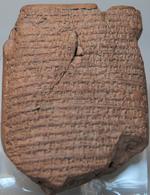|
Nebuchadnezzar
605-562BC (43) |
|||||||
The Chronicle Concerning the Early Years of Nebuchadnezzar II ("Jerusalem Chronicle"
1. In the twenty-first year [605/604;note 1] the king of Akkad[Nabopolassar] stayed in his own land, Nebuchadnezzar his eldest son, the crown-prince, 2. mustered the Babylonian army and took command of his troops; he marched to Karchemiš which is on the bank of the Euphrates, 3. and crossed the river to go against the Egyptian army which lay in Karchemiš. 4. They fought with each other and the Egyptian army withdrew before him. 5. He accomplished their defeat and beat them to non-existence. As for the rest of the Egyptian army 6. which had escaped from the defeat so quickly that no weapon had reached them, in the district of Hamath 7. the Babylonian troops overtook and defeated them so that not a single man escaped to his own country. 8. At that time Nebuchadnezzar conquered the whole area of Hamath. 9. For twenty-one years Nabopolassar had been king of Babylon, 10. when on 8 Abu[15 August 605] he went to his destiny; in the month of Ululu Nebuchadnezzar returned to Babylon 11. and on 1 Ululu [7 September] he sat on the royal throne in Babylon. 12. In the accession year Nebuchadnezzar went back again to the Hatti-land and until the month of Šabatu 13. marched unopposed through the Hatti-land; in the month of Šabatu he took the heavy tribute of the Hatti-territory to Babylon. 14. In the month of Nisannu he took the hands of Bźl and the son of Bźl and celebrated the Akitu festival. 15. In the first year of Nebuchadnezzar [604/603]in the month of Simanu he mustered his army 16. and went to the Hatti-territory, he marched about unopposed in the Hatti-territory until the month of Kislīmu. 17. All the kings of the Hatti-land came before him and he received their heavy tribute. 18. He marched to the city of Aškelon and captured it in the month of Kislīmu. 19. He captured its king and plundered it and carried off spoil from it. 20. He turned the city into a mound and heaps of ruins and then in the month of Šabatu he marched back to Babylon. 21. In the second year [603/602] in the month of Ajaru the king of Akkad gathered together a powerful army and marched to the land of Hatti. 22. ...] he threw down, great siege-towers he [... 23. ...] from the month of Ajaru until the mon[th of ...] he marched about unopposed in the land of Hatti. About four lines missing Reverse Several lines missing 1'. In the third year [602/601] the king of Akkad left and 2'. in the month of [...] on the thirteenth day, [the king's brother] Nabū-šuma-lišir [...] 3'. The king of Akkad mustered his troops and marched to the Hatti-land. 4'. and brought back much spoils from the Hatti-land into Akkad. 5'. In the fourth year [601/600] the king of Akkad mustered his army and marched to the Hatti-land. In the Hatti-land they marched unopposed. 6'. In the month of Kislīmu he took the lead of his army and marched to Egypt. The king of Egypt heard it and mustered his army. 7'. In open battle they smote the breast of each other and inflicted great havoc on each other. The king of Akkad turned back with his troops and returned to Babylon. 8'. In the fifth year [600/599] the king of Akkad stayed in his own land and gathered together his chariots and horses in great numbers. 9'. In the sixth year [599/598] in the month of Kislīmu the king of Akkad mustered his army and marched to the Hatti-land. From the Hatti-land he sent out his companies, 10'. and scouring the desert they took much plunder from the Arabs, their possessions, animals and gods. In the month of Addaru the king returned to his own land. 11'. In the seventh year [598/597], the month of Kislīmu, the king of Akkad mustered his troops, marched to the Hatti-land, 12'. and besieged the city of Judah and on the second day of the month of Addaru he seized the city and captured the king [Jehoiachin; note 2]. 13'. He appointed there a king of his own choice [Zedekiah], received its heavy tribute and sent to Babylon. 14'. In the eight year [597/596], the month of Tebetu the king of Akkad marched to the Hatti-land as far as Karchemiš [... 15'. ...] in the month of Šabatu the king returned to his own land. 16'. In the ninth year [596/595], the month of [...] the king of Akkad and his troops marched along the bank of the Tigris [...] 17'. the king of Elam [...] 18'. the king of Akkad [...] 19'. which is on the bank of the Tigris he pitched his camp. While there was still a distance of one day's march between them, 20'. the king of Elam was afraid and, panic falling on him, he returned to his own land. 21'. In the tenth year [595/594] the king of Akkad was in his own land; from the month of Kislīmu to the month of Tebetu there was rebellion in Akkad. 22'. With arms he slew many of his own army. His own hand captured his enemy. 23'. In the month of [...] he marched to the Hatti-land, where kings and [...]-officials 24. came before him and he received their heavy tribute and then returned to Babylon. 25. In the eleventh year [594/593] in the month of Kislīmu, the king of Akkad mustered his troops and marched to the Hatti-land. |
|||||||
|
|
|||||||
| Free JavaScripts provided by The JavaScript Source | |||||||
 Obverse
Obverse